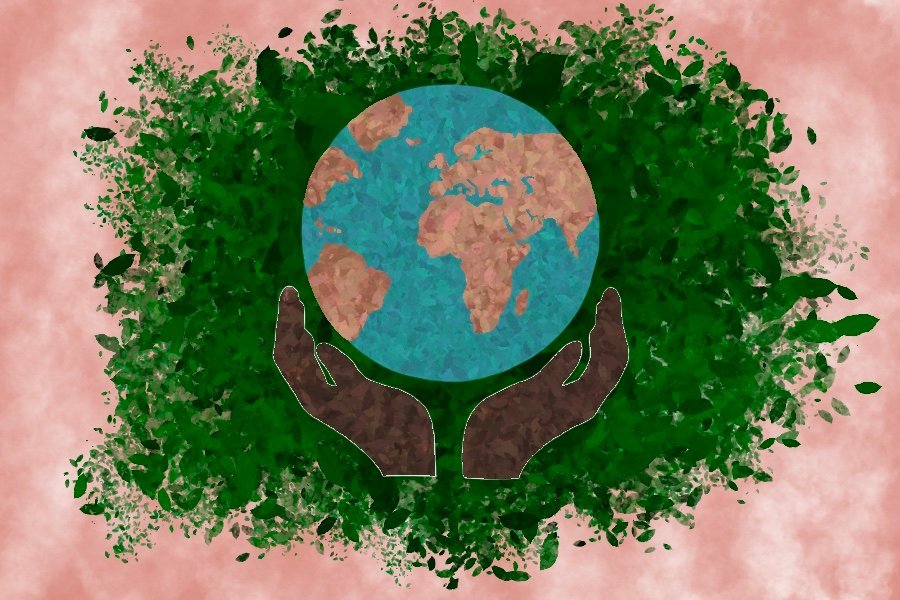Evanston Fight for Black Lives talks plans for sustainable community garden
Daily file illustration by Catherine Buchaniec
EFBL organizers discussed plans for a community garden with the Metropolitan Water Reclamation District of Greater Chicago at an Earth Week event hosted by Citizens’ Greener Evanston. They talked about ways that community gardens could be used to address climate change, food insecurity, water conservation and racial injustice.
April 26, 2021
Members of Evanston Fight for Black Lives and the Metropolitan Water Reclamation District of Greater Chicago discussed plans to create a sustainable community garden and freshwater conservation in the Great Lakes region at a virtual panel Friday.
The event was part of Citizens’ Greener Evanston’s “Earth Week for Everyone” series, which took place Thursday through Saturday in honor of Earth month. EFBL organizer Emma Barreto said she wants sustainable living to be a community project rather than an individual one.
For EFBL, sustainability means building a community garden in a vacant lot in the Fifth Ward. Barreto, along with fellow EFBL organizer Maia Robinson, said they would use the garden to grow food and flowers and create a space for community engagement.
“Historically, the environment has been used as a tool to oppress us,” Robinson said, referencing racial injustices like slavery and sharecropping. “Now, we’re looking at a way that we can understand that history while also relearning the ways that we can use the environment to our own benefit.”
Barreto said a community garden could provide food, jobs and community for Black residents while also addressing climate change. However, EFBL has struggled to locate a vacant lot for the garden.
According to Project Drawdown, a nonprofit organization researching climate solutions, sustainable food production is an important path to climate change mitigation. This is sometimes called “regenerative agriculture,” farming techniques that reverse climate change by reducing reliance on carbon-intensive equipment and improving soil health.
Regenerative agriculture is a response to industrial agriculture, which, according to the US Department of Agriculture, currently produces 10.5 percent of greenhouse gas emissions in the United States. Industrial agriculture emits carbon via mechanized equipment and large-scale irrigation systems that run on fossil fuels.
Further, industrial farms use a technique called monoculture farming, or “monocropping,” where a single crop is grown on the same land year after year. Since single crops are vulnerable to being wiped out by disease, industrial farms apply more pesticides and regularly till soil — both practices that disrupt microbial communities that naturally sequester carbon.
Debra Shore, commissioner of the Metropolitan Water Reclamation District of Greater Chicago, said local agriculture could also be important for conservation, because regions like California often import water from water-rich regions in order to irrigate crops.
While California doesn’t currently irrigate with water from the Great Lakes, Shore said transporting water requires energy that could be conserved if water-rich regions produced those crops themselves.
“It doesn’t make sense to export things like tomatoes from the central valley of California, where it’s water scarce… to water-rich places like Chicago,” she said.
Shore said as climate change, pollution and population growth make freshwater more scarce, the Great Lakes region will need to find ways to conserve water — including expanding local agriculture.
Robinson said a community garden could address problems like food insecurity and joblessness on top of climate change. She said the garden would freely distribute produce to those in need while also selling to residents with the means to pay.
According to the USDA, one in four households experienced food insecurity amid the pandemic, and according to the National Institutes of Health, food insecurity is more prevalent among Black, Latine and Indigenous communities, especially when it comes to accessing healthy food options.
These types of barriers exist on the local level as well. Evanston’s 5th Ward lacks a local supermarket, leaving residents to shop at convenience stores which often lack healthy food options. This, in turn, can perpetuate patterns that lead to significantly disparate health outcomes across the country.
Ajiah Gilbert, a member of Greenest Region Corps, an organization that partners with Chicago-area governments to implement sustainability projects, moderated the event. Gilbert said she was excited by the lively discussion portion where attendees exchanged ideas with Barreto and Robinson.
“There’s so many great ideas but there’s so many hills to go over,” she said.
Email: williamclark2024@u.northwestern.edu
Twitter: @willsclark01
Related Stories:
— Community leaders discuss environmental justice at Citizens’ Greener Evanston Event
— The Daily Northwestern’s Climate and Environmental Policy Guide to Evanston’s Mayoral Candidates
— EFBL and NUCNC honor Adam Toledo and Daunte Wright in march for police abolition


